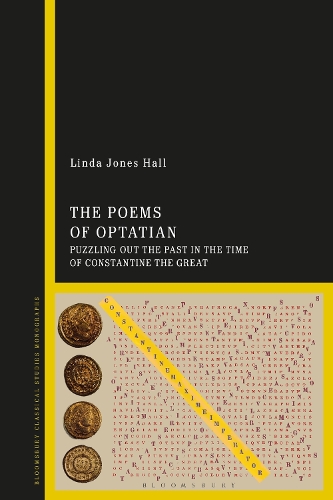
The Poems of Optatian: Puzzling out the Past in the Time of Constantine the Great
(Hardback)
Available Formats
Publishing Details
The Poems of Optatian: Puzzling out the Past in the Time of Constantine the Great
By (Author) Linda Jones Hall
Bloomsbury Publishing PLC
Bloomsbury Academic
11th January 2024
United Kingdom
Classifications
Professional and Scholarly
Non Fiction
Poetry / poems by individual poets
871.01
Physical Properties
Hardback
256
Width 157mm, Height 234mm, Spine 20mm
540g
Description
For the first time, the poems and accompanying letters of Publilius Optatianus Porfyrius (Optatian) are published here with a translation and detailed commentary, along with a full introduction to Optatians work during this period. Optatian was sent into exile by Constantine sometime after the Emperors ascent to power in Rome in 313. Hoping to receive pardon, Optatian sent a gift of probably twenty design poems to Constantine around the time of the emperors 20th anniversary (325/326). To enable the reader to experience the multiple messages of the poems, the Latin text is presented facing the English translation with any related design nearby. Some poems, laid out on a grid of up to 35 letters across and down, have an interwoven poem inked over key letters in the primary poem, thereby revealing a highlighted image. Some designs include the Chi-Rho or numerals created from Vs and Xs to mark imperial anniversaries. Other (previously unrecognised) designs seem to represent senatorial, imperial, military or bureaucratic regalia or to derive from coin images. Shape poems representing a water organ, an altar, and a panpipe reveal their relevance immediately. The Introduction and commentary elucidate literary allusions from over 100 authors (lines from Vergil, Ovid, Lucan, Silius Italicus, Statius, and lesser-known writers abound) and mythological references, mostly to the Muses and Apollo. Optatians prestige as an official in both Greece and Rome is well attested - these poems mark Optatian as a fascinating writer of his time, holding onto the classical past while acknowledging Christian symbolism.
Author Bio
Linda Hall is Professor Emerita of History at St Marys College of Maryland, USA. Her publications include Roman Berytus: Beirut in Late Antiquity (2004).
